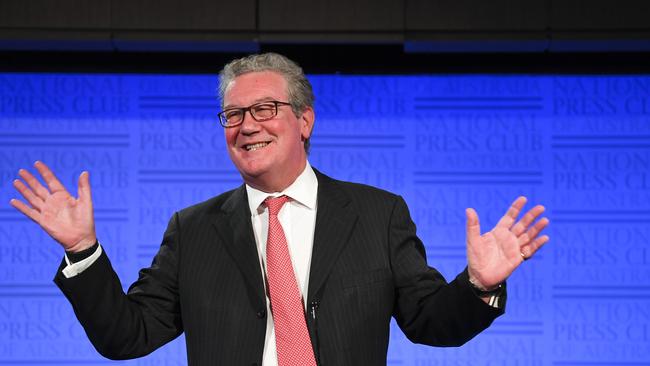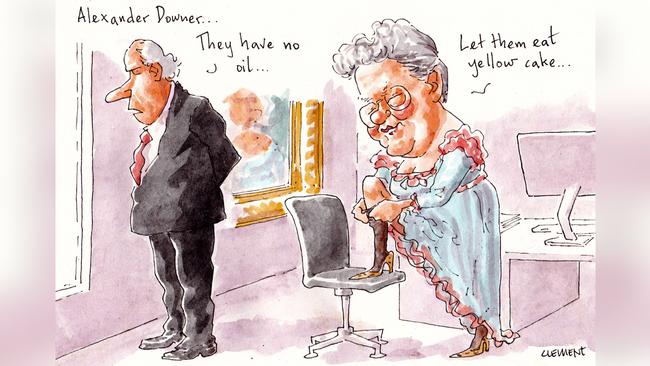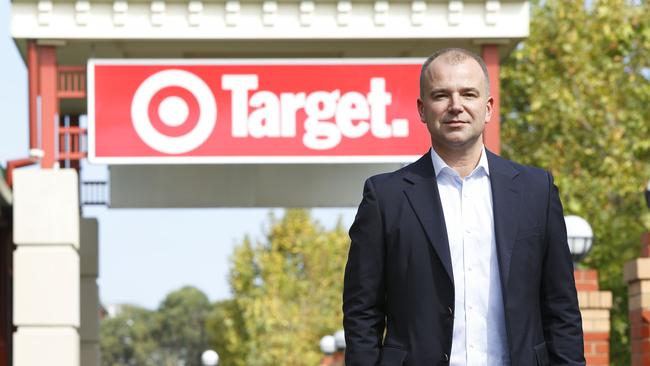Alexander Downer hits the uranium boom time as Rob Scott’s Wesfarmers digs deeper into digital


When it comes to former Australian politicians joining the boards of public companies, the record is rather patchy. To be honest, it’s pretty awful, with a number of disasters, insolvencies, court cases, share-price collapses and shareholder lawsuits enough to keep them away from equity markets for good.
So much easier for them to just sit back and enjoy their public service pensions.
Politicians who have been belted by the sharemarket and investors like a pinata at a child’s birthday party have included Michael Wooldridge, John Dawkins, the late Andrew Peacock (he admitted trying to rescue the collapsed MFS through the Global Financial Crisis soaked up as many hours as when he was opposition leader in the 1980s), former Crown Resorts chair Helen Coonan and Steve Bracks (he chairs Victory Offices, whose shares are down 94 per cent). Former Liberal leader John Hewson and the collapse of Elderslie Finance, which he once chaired, also comes to mind.
However, on the positive side, former Victorian premier Jeff Kennett and prime ministers Sir Robert Menzies and Viscount Stanley Bruce all did well at Equity Trustees. Peter Costello at Nine Entertainment can hold his head up. Then there was also the late Keith De Lacy at Macarthur Coal. Former deputy PM Mark Vaile also rates a mention at Whitehaven Coal.
Now step forward Alexander Downer, former foreign affairs minister and high commissioner to the UK, who is currently setting the benchmark for sharemarket success among former politicians.
He has pulled off an absolute blinder at uranium investment play Yellow Cake Plc.
Shares in Yellow Cake, which are listed on the AIM market in London and based in the Channel Islands, are up 34 per cent in the last month and since listing in 2018 have risen 111 per cent. Last week Yellow Cake shares slumped 10 per cent as the war in Ukraine raged, but since then it has recovered that lost ground and then some.

As Downer told Margin Call from his home in London, he joined Yellow Cake when it was just a start-up and now it’s become a £800m ($1.43bn) company. Downer knew the bankers behind the company when it was created and, being a backer of uranium and its future as a key source of energy, he jumped on board as a director.
He’s also backed that belief with cash and holds just under 30,000 shares in Yellow Cake representing about 0.02 per cent of its issued capital. On today’s market, They are worth about £130,000. As Downer said: “It helps pay the rent.”
Yellow Cake is an old-fashioned listed investment company with a twist – it was created to buy and hold uranium oxide, offering investors exposure to the spot uranium price without exploration, development, mining or processing risk. It currently is sitting on 15.83 million pounds of uranium oxide – not literally, that would be dangerous, it’s held in storage facilities in Canada and France – and in January, with a spot price of $US42 a pound, its uranium was worth $US665m.
Downer has a commonsense approach to investing and isn’t backwards in coming forwards when it comes to the lack of support for fossil fuels among the political class.
“For politicians it’s very fashionable to oppose fossil fuels as long as they are not paying for anything,” Downer told Margin Call. He also decried the mass exodus from fossil fuel investments by pension and superannuation funds, and knows full well for every seller there is a buyer and that hedge funds are booking super profits in the hundreds of millions from picking up these assets from desperate sellers.
It looks as though Downer has become a fan of the mining sector, having recently joined the board of ASX-listed Ironbark Zinc, which is looking to develop a zinc project in Greenland. A fellow director on the Ironbark Zinc board is Paul Cahill, the co-founder of London-based Bacchus Capital Advisers, which coincidentally created and listed Downer’s Yellow Cake.
And what next? An investment tip perhaps from the successful politician turned investor to help Margin Call pay its rent? Downer said he liked the look of “white hydrogen” or natural hydrogen as a future energy source.
–
Rob Scott’s digital push for Wesfarmers
Wesfarmers is racing ahead with its digital ambitions and is now working on its new OnePass online subscription model that has replaced the old Club Catch loyalty program at its online marketplace business Catch Group. The Perth-based conglomerate bought Catch Group from founders Gabby and Hezi Leibovich for $230m only six months before the Covid-19 pandemic emerged.
The timing of the purchase was good, sales for Catch have rocketed since the pandemic began. And its profits? Not so good. They are missing in action of late, with Catch posting a pre-tax loss of $44m for the first half of 2022, a full-year loss of $46m in 2021 and a profit of $1m in 2020.


Meanwhile, Wesfarmers has big plans for its OnePass program and believes it can be handy for keeping shoppers bonded to Catch but also other parts of the retail empire presided over by Wesfarmers boss Rob Scott.
Wesfarmers has set up a new corporate entity called Wesfarmers A Plus, with its own board. Its directors include Scott as well as the CEOs of the conglomerate’s key business units including Bunnings boss Mike Schneider, Officeworks boss Sarah Hunter and Kmart Group boss Ian Bailey.
Also on the Wesfarmers A Plus board is Nicole Sheffield, the recently appointed head of digital and data for Wesfarmers who came from Australia Post following an exodus of senior managers when Post boss Christine Holgate was shown the door.
–
Stuart Machin bounces back from Target
Talk about bouncing back. It was around this time six years ago that Stuart Machin’s career was almost in tatters after the Wesfarmers executive resigned in the wake of investigations into potential accounting irregularities with Target’s financial results.
Machin was running Target and, while it was argued he knew nothing of the irregularities, they happened on his watch and he thus fell on his sword.
At the time a number of Target executives were being investigated over allegations that the discount department store requested rebates from overseas suppliers on the promise that those excess payments would then flow back again in the form of higher prices. It is believed these rebates, paid in the first half but then returned to suppliers in a later accounting period, helped inflate Target’s first-half profit by as much as 25 per cent.

Out Machin went, and back to the UK. But who needs Target? Now Machin has reached the heights of retail after being named the new CEO of venerable British retailer Marks & Spencer after being promoted from his role as M&S food boss and chief operating officer. However, he will have a co-CEO in Katie Bickerstaffe, the first female boss of M&S in its 138-year history.



To join the conversation, please log in. Don't have an account? Register
Join the conversation, you are commenting as Logout